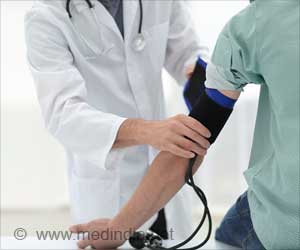Researchers have found that as many as 50 percent of overweight men and women with high blood pressure may have hypertension as a result of being overweight, and not obese.
Italian researchers have found that as many as 50 percent of overweight men and women with high blood pressure may have hypertension as a result of being overweight, and not obese.
The researchers reported the study at the American Heart Association’s 61st Annual Fall Conference of the Council for High Blood Pressure Research.They found that about 50 percent of overweight, hypertensive adults, between the age group of 29 and 65 years, achieved normal body weight and blood pressure after six months of treatment with a reduced-calorie diet.
“This is important because it means that in these patients with elevated blood pressure who were overweight, the blood pressure was not a form of essential hypertension but was hypertension secondary to body weight,” Roberto Fogari, M.D., lead investigator of the study and professor of medicine at the University of Pavia, Italy, said.
“These findings apply to western societies in general, but only to overweight patients, not to obese patients, with high blood pressure,” he added.
About one in three American adults have high blood pressure, which is defined as a systolic pressure of 140 mm Hg or higher or a diastolic pressure of 90 mm Hg or higher. High blood pressure increases the risk for heart disease and stroke.
The researchers therefore conducted a study in which they analyzed 210 overweight men and women whose systolic blood pressure was more than 140 mmHg, but less than 159 mm Hg, and whose diastolic blood pressure was more than 90 mm Hg, but less than 99 mm Hg.
Advertisement
“The diet’s main aim was to reduce calories to reduce the weight of each patient,” Fogari said.
Advertisement
Orlistat is in a class of drugs called lipase inhibitors. It works in the intestines, where it blocks some of the fat eaten from being absorbed and digested. This undigested fat is then removed in bowel movements. It is often used with a low-calorie diet to achieve weight loss and maintain weight after weight loss in overweight patients who also may have high blood pressure, diabetes, high cholesterol or heart disease.
“We gave orlistat only when diet alone was not able to achieve the appropriate reduction in body weight,” Fogari said.
The dosages of orlistat varied from 120 milligrams (mg) to 360 mg daily and were individualized.
The purpose of the study was to significantly reduce body weight by diet alone or diet plus orlistat and to evaluate the role that body weight loss had on blood pressure values.
After six months of dietary treatment, 49 percent of women and 53 percent of men achieved body weight reduction and normalization — more than 5 percent weight loss, researchers said.
The researchers also found a mean reduction in systolic and diastolic blood pressure of about 5 percent.
Fogari stressed on the importance of initiating dietary advice and treatment in overweight patients with high blood pressure before beginning drug treatment.
“The first step is to help the overweight patient lose weight. Only after six months of trying to reduce the patient’s weight can a decision be made about drug treatment,” he said.
In the ongoing study, patients were evaluated at baseline, and after six and 12 months of treatment.
Source-ANI
SRM/M











